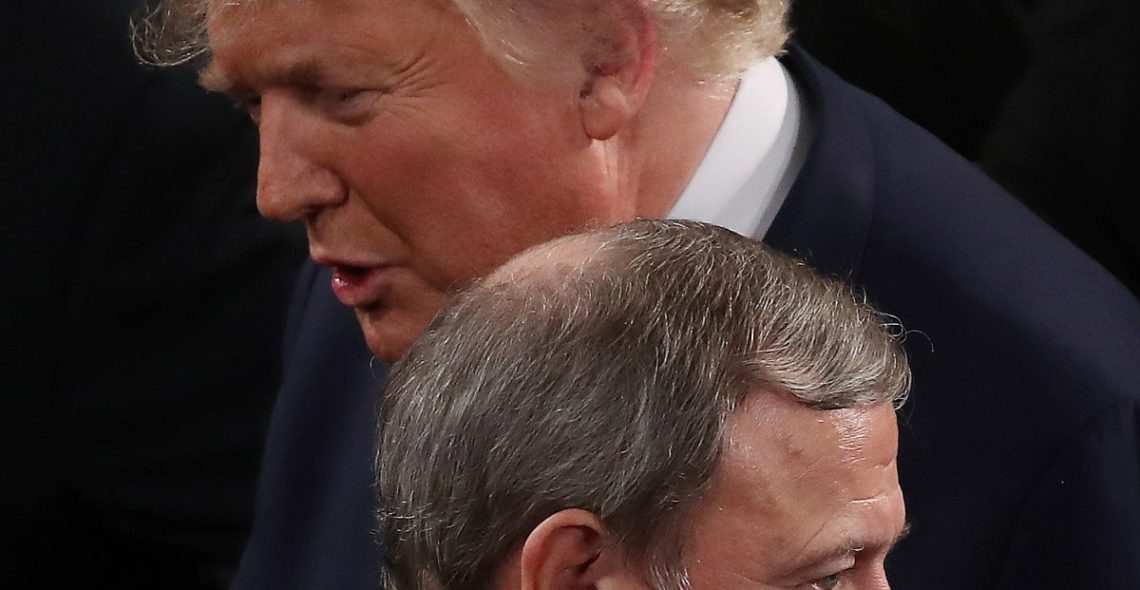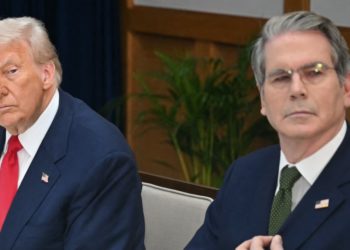The Supreme Court’s Wednesday morning argument on President Donald Trump’s ever-shifting tariffs went better for him than the 2025 elections, but only slightly so.
At least two of the Court’s Republicans — Justices Neil Gorsuch and Amy Coney Barrett — appeared very likely to join the three Democratic justices in striking down those tariffs, and they will likely be joined by Chief Justice John Roberts. Though that does leave three votes for Trump, three is not enough.
If the tariffs do, indeed, fall, it will be a dramatic turn from a Supreme Court that has largely behaved as lickspittles to the Republican president. This is, after all, the same Court that held that Trump is allowed to use the powers of the presidency to commit crimes. And it’s spent most of the last year handing down dozens of unexplained decisions in favor of Trump on the Court’s “shadow docket.”
But one thing that sets the tariffs cases, known as Learning Resources v. Trump and Trump v. V.O.S. Selections, apart from those other Trump-related cases is that there are many voices within the Republican Party — and especially within its de facto legal arm, the Federalist Society — that oppose Trump’s tariffs. One of the lead lawyers challenging the tariffs is Michael McConnell, a former George W. Bush appointee to the federal bench. At a Federalist Society conference last spring, many speakers doubted the tariffs’ legality. Several prominent Republicans joined briefs attacking the tariffs.
It’s worth noting that the strongest argument against the tariffs involves the Supreme Court’s “major questions doctrine,” a limit on presidential power that was recently invented by the Court’s Republicans, and that is so new that it has only ever been used against one president: Joe Biden. V.O.S. Selections and its companion case potentially give the Republican justices a chance to legitimize this doctrine by applying it to one of their fellow Republicans — potentially in an opinion joined by all three of the Court’s Democrats.
In any event, it is always dangerous to predict that this Supreme Court will break with Trump, given the extraordinary loyalty its Republican majority has shown toward him in the past. It is always possible that, once the justices meet to discuss this case in private, they will retreat into their partisan camps and Trump will eke out a victory.
But, based on the questions the justices asked on Wednesday, it at least seems more likely than not that Trump’s tariffs will fall.
What are the legal issues in this case?
V.O.S. Selections turns on a federal law, the International Emergency Economic Powers Act of 1977 (IEEPA), which permits the president to “regulate…transactions involving, any property in which any foreign country or a national thereof has any interest.” This power may only be exercised to “deal with an unusual and extraordinary threat.”
The plaintiffs challenging the tariffs, who include several state governments and also small businesses, argue that the word “regulate,” as it is used by IEEPA, does not include the power to impose taxes on imports. They also argue that Trump has not identified an unusual and extraordinary threat that can justify the tariffs. (Trump, for example, claims that many of his tariffs are necessary to address trade imbalances that have existed since the 1970s — which means these imbalances are both usual and ordinary.)
The plaintiffs also point to the major questions doctrine, which is supposed to prevent the executive branch from imposing policies that have “vast ‘economic and political significance,’” even when an existing federal statute could be read to authorize those policies.
Early in the argument, Barrett appeared persuaded by the argument that the power to regulate is distinct from the power to tax. She asked Solicitor General John Sauer to identify a Supreme Court case that read a statute that uses this word to permit taxation, and appeared unpersuaded by his responses. Barrett opened her question by pointing out that the only case he previously identified wasn’t a Supreme Court case at all; it was a lower court decision interpreting a law that Congress replaced with IEEPA.
Gorsuch, by contrast, appeared completely unpersuaded by the plaintiffs’ statutory arguments, at one point asking plaintiffs’ lawyer Neal Katyal, “Do you need major questions to win?” before answering his own question with: “I kind of think you might.”
Yet, despite this letdown for the plaintiffs, Gorsuch’s exchange with Katyal came after an absolutely blistering exchange with Sauer, where Gorsuch warned that if Congress could give Trump the tariffing power he seeks today, it could permit him to do virtually anything. “Could Congress delegate to the president” its entire power to “regulate commerce with foreign nations?” Gorsuch asked. Could it give him its entire power to “declare war”?
Gorsuch has historically been one of the Court’s most vocal skeptics of laws giving expansive policymaking authority to the executive branch. And he appeared deeply troubled by the scope of the power Trump is claiming in this case.
Roberts appeared to share those concerns. At one point, he told Sauer that the major questions doctrine appears to be “directly applicable” to this case, pointing out that IEEPA has never been used before to justify tariffs, and that Trump now claims the power to impose tariffs “on any product, from any country, in any amount, for any length of time.”
So if any two among Roberts, Gorsuch, and Barrett hew to these views, it is almost certain that the tariffs will fall — although it is less clear whether the Court will rely on a statutory argument or the major questions doctrine. All three of the Court’s Democrats also appeared very likely to oppose the tariffs.
Even if Trump loses, he may be able to revive some of his tariffs later
Though Trump appears likely to lose this case, a Supreme Court decision against him is unlikely to end his trade war. There are other statutes he can rely on to impose tariffs, although those laws give him limited authority. One, for example, permits tariffs of up to 15 percent that must expire after 150 days.
It’s also worth noting that Barrett asked several questions — that were frankly very difficult to parse — about a separate provision of IEEPA allowing the president to regulate trade “by means of…licenses.” Though Trump’s lawyers did not rely on this provision at all in defending the tariffs, she seemed to think that it might permit Trump to revive at least some tariffs in the form of “licensing fees.”
In any event, it’s unclear how this licensing fee loophole, which may allow Trump to revive some tariffs under another name, would work. But the legal fight over the tariffs is likely to continue for much — if not all — of Trump’s remaining time in office. And that’s assuming that this Court, which is ordinarily hyper-deferential to Trump, does not uphold his tariffs under IEEPA.
Based on Wednesday’s argument, however, it appears more likely than not that two or three Republican justices will make a rare break with the leader of their political party.
The post The Supreme Court might actually stand up to Trump appeared first on Vox.




